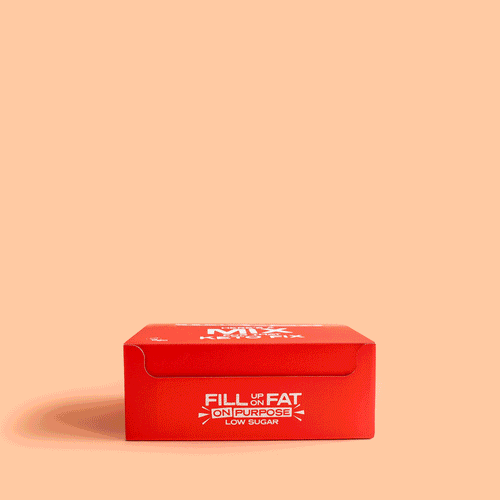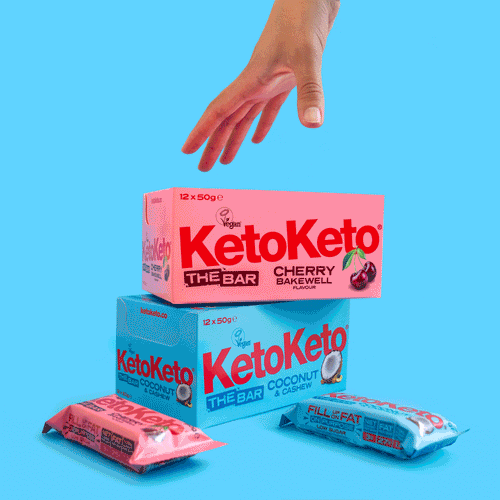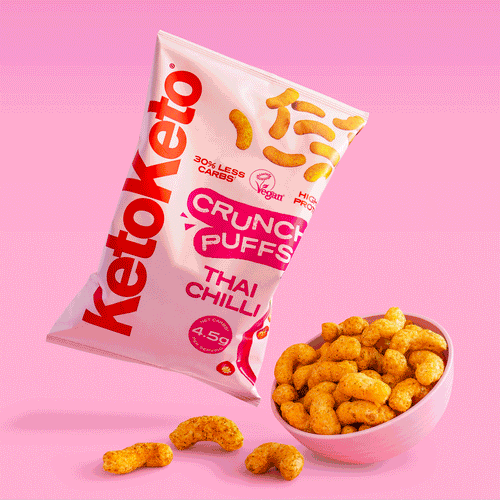Macros - the shortened name for macronutrients, are the three main food groups we eat to fuel our bodies; fat, protein and carbohydrates.
The Ketogenic diet is based on eating mostly fat, a moderate amount of protein, and very little carbohydrates. Compared to the typical modern diet which consists of mostly carbohydrates, some protein and minimal fat.
The Keto diet highlights the importance of particular macros in metabolism and weight gain/loss: The Keto diet works on the principle that without carbs (or at least very few), the body uses fat to fuel the body instead of carbs. Helping you to reduce body fat and simultaneously balance blood sugars and improve overall health.
What Is Tracking?
Tracking your macros is essentially adding up all the food and drink you consume each day; helping you keep to personal limits and reach your health goals. It’s like accounting for your health - you make sure all the amounts balance and you do not exceed your allowance!
So what macros matter and what are the best ways to keep track of them? Read on to find out all you need to know, and the benefits of noting the essential details.
Macros That Matter
![]()
Fats
Keto is focused on the fats you consume. They’re the main part of a Ketogenic diet because the purpose of Keto is to fuel your body by burning fat, rather than glucose. The percentage of fat you should be consuming on a Ketogenic diet is 80%.
Fat is good for your health, despite what many health advisors have suggested in recent years. It’s the quality of the fat that matters. When you include healthy fats in your diet such as medium-chain triglycerides and Omega-3 fatty acids, you support your body with essential nutrients for nerve, muscle and immune health.
Fat is great at helping you feel satiated and fuller for longer, so you don’t experience hunger spikes and cravings.Contrary to common belief, healthy fats can actually help you lose weight rather than gain it.
Protein
The percentage of protein you should include in your diet tends to be similar across different diet plans. On Keto, you ought to be aiming for between 15-20% of your calories from protein.
Proteins are made up of amino acids, which are the building blocks of all the tissues in your body. It’s therefore really important that you include a moderate amount of protein in your diet so your tissues can grow and regenerate correctly. Protein-rich foods also help you feel full for longer and keep hunger at bay.
Net Carbohydrates
Only minimal if any carbs should be included in your meals on Keto. This is a real challenge with a limit of less than 5% of your calorie intake.
Net carbs refer to the carbohydrates your body will absorb; those that will affect your blood sugars, insulin levels, and metabolic state. Not all carbohydrates are absorbed by your body - certain carbs such as fibre and sugar alcohols cannot be easily digested.
For this reason, fibre and sugar alcohols can be deducted from your total carbohydrate intake, to provide you with your net carb allowance. The difference between total carbs and net carbs can be significant, particularly for foods which are high in fibre such as vegetables, nuts and seeds.
Using a net carb limit gives you a little leeway and allows you to eat more nutrient-dense foods that are essential for optimum health. Providing you with a well-balanced diet that also helps you achieve your health and fitness goals.
Calories
Calories are not a macronutrient, but they have an essential role to play in tracking and maintaining your macro portions. Calories are the measurement of energy provided by the food you eat, and inform you how much energy you’re supplying your body with each day. Each macronutrient corresponds to a specific calorie content per gram:
Carbohydrates - 4 calories per gram
Protein - 4 calories per gram
Fat - 9 calories per gram
Additionally, in order to calculate your personal macro portions, you first have to know your Daily Amount of Calories (DAC).
Your DAC depends on your Basal Metabolic Rate (BMR); how many calories your body needs to survive. This helpful online calculator can do the hard work for you. You’ll also need to take into account your activity level and health goals, such as losing weight or building muscle to get the right DAC for you.
![]()
Why Track Macros?
You may be wondering if it’s necessary to keep track of everything you eat each day. If you’re serious about hitting your health targets and are keen to see results as soon as possible; tracking your macros is going to help you do that.
By accounting for every macro and calorie you consume on Keto, you can tailor your Keto plan to your body and goals. You can push past plateaus in progress and make sure all the efforts you’re making serve you well. There’s no point doing Keto half-heartedly; if you want to see it pay off, tracking your macros will go a long way in helping you hit those targets.
By keeping a close eye on everything that goes into your body you’ll make progress quicker and easier. You’ll reduce the likelihood of over or under-eating so you’re properly fuelled for your daily activities. The great results will keep you motivated, and you’ll have the energy you need to power you through your day.
Consistently tracking your macros will also familiarise you with the right portion sizes for your body and activities, making it easier to identify the right amounts. This will come in handy whenever you need to eyeball amounts in a hurry, or if you’re out for a meal someone else has prepared for you; you’ll be better able to eat the correct macro amounts to keep you on track with your Keto plan.
Easy Ways To Track Macros
You now know why tracking your macros and calories is important to your progress, so what are the easiest ways to track your macros?
There are many great apps you can download o help you keep track throughout the day. This may be especially helpful if you’re always on the go and need something you can easily update on a whim.
Such applications usually include tools such as barcode scanners, which you can use to scan any products you buy; it will provide you with all the essential nutritional info you need and easily transfer the details to your tracker.
Apps are also incredibly helpful for tracking your macros and calories since they typically have a database of food and drink items like, ‘avocado’ or ‘green olives’. You can easily look up a number of items and access the relevant nutritional info you need to accurately monitor your macros.
Another great way to keep track is to simply take note of the amount of macros you eat at each meal or snack. This can again be done on your phone or you could use a notebook and pen, whichever is your preferred method of recording the details.
Either way, as long as you keep track of what you’re eating throughout the day, you can keep on top of the macro quantities and calories you’ve consumed.
Macro Tracking Tips
You’ve got the what and the why of tracking macros, so how about some tips to keep you on track? We have some fantastic ideas to get you started:
Record The Right Info
An essential tip to keep track of your macros and calories is to know exactly what information you need to note.
You’ll need to measure any and all servings of your ingredients. Some ingredients may be easily missed so make sure you record everything! From the oils you cook with to toppings on your meals; they all need to be accounted for, no matter how small the amount.
Make sure you take note of the serving size too; you’ll be tailoring your portion sizes to you, so make sure you record these when inputting the info into your tracker or notebook.
With these measurements and portion sizes you’ll be able to record the number of grams of fat, protein and net carbs of each meal along with the relevant calories. These figures can be added up throughout the day to give you a running total.
Equip Yourself
Like with anything you intend to do well, you need to make sure you’re fully equipped to do the job. Keep an accurate account of your macros and calories by purchasing a few simple tools such as measuring spoons, cups and kitchen scales.
These affordable pieces will be invaluable for keeping track of your macros. They’ll come in handy as you prepare and portion up anything you cook from scratch, but also for measuring out pre-packaged items to ensure you keep to your precise macro limits.
Our bars are made to help curb cravings and keep you fuller for longer. With only 3g of net carbs per bar, they’re the
perfect Keto snack for anytime during the day. Save more when you buy more, by taking advantage of our Box Combo deal. Pick your favourite flavours or try a new
flavour for a change.
The KetoKeto Box Combo
Meal Plan & Prep
Meal planning will go a long way in helping you keep on track of your macros and calorie intake. You can research meals and macros ahead of time, make a shopping list, and ensure all the meals and snacks on your meal plan adhere to your macro portions.
It’s a great idea to invest a little time into this task if you want to stay on track and reduce the likelihood of eating too much or too little. In the long run it will likely save you time, money and stress, while importantly help you succeed with your Keto goals.
Preparing meals in bulk can also be a huge money and stress saver. By preparing large batches of your favourite Keto meals and snacks ahead of time, you can accurately weigh and portion up to your precise macro amounts.
This way you won’t have to weigh and portion ingredients every time you need to eat. You’ll have the perfect portions ready-made whenever you need them.
Tracking For Success
Tracking macros and calories may seem like a lot of effort, but if you’re determined to make Keto work for your health, it’s a vital component of the lifestyle.
By keeping track of the macros and calories you consume each day, you can ensure you eat the perfect amount to keep you energised and hit your health targets as quickly as possible. If you want to achieve your goals; whether it’s losing weight, building muscle or improving a health condition, tracking your macros is the way to go.
With an array of modern applications it’s simple and easy to do, and you’ll give yourself the best chance of succeeding with Keto.






